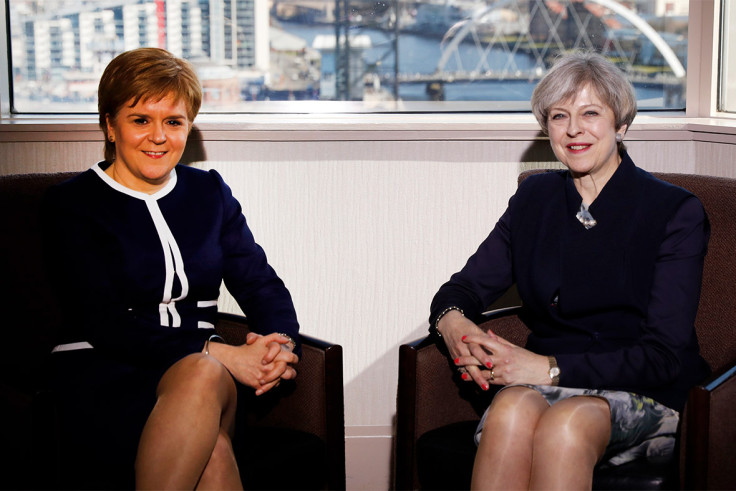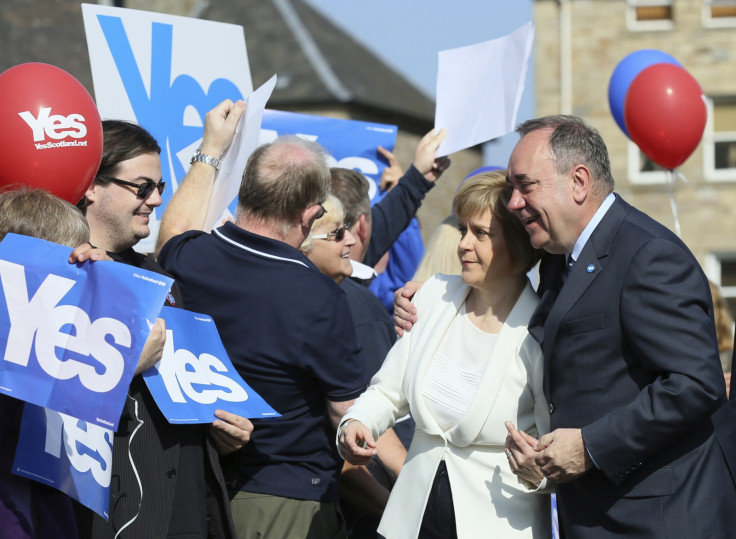Theresa May wants to hold Scotland hostage within Brexit Britain
To deny a second Scottish independence referendum - IndyRef2 - would be democratically indefensible.

Give Theresa May her due, the final week of March 2017 never seemed like it was going to be a quiet one.
The two-year countdown on withdrawal from the EU is being triggered. The elected Scottish Parliament is mandating Nicola Sturgeon to hold a referendum on Scotland becoming an independent state for the first time in three centuries. And the power-sharing institutions in Northern Ireland are collapsing before our very eyes.
So it takes a special kind of talent for any British prime minister to kick the week off by heading into the eye of the storm with a jaunt to Scotland to deliver a speech that said absolutely nothing and sent the press pack into a doze.
To the extent that the visit helped clear the mists just a little, it was only thanks to a combination of Sturgeon's quick-witted nature and the shadowy Downing Street "sources" who occasionally fill a May-shaped void by saying something mildly interesting when the PM declines to. (Indeed, it's beginning to seem that the most natural head-to-head battle in the TV referendum debates will be between Ms Sturgeon and "sources".)
Because much of the London media seems unable or unwilling to pose the right questions, May had hitherto been getting away with the fiction that she is only saying no to an independence referendum "now", and is only doing it because the terms of the Brexit deal are not yet known.
That dodge did not survive the face-to-face encounter with Sturgeon, who successfully established that the Brexit deal would be concluded within two years, in plenty of time to suit the planned timetable for a referendum by spring 2019. Sturgeon left the meeting triumphantly and announced that there was no remaining legitimate excuse for blocking her proposal.
It proved enough to spark some life into Mr or Mrs Downing Street Source, who by all accounts spluttered indignantly that it wouldn't be sufficient for the people of Scotland to merely know the terms of Brexit, they actually needed a taste of what those terms would feel like in the "real world" before they could decide whether they would prefer to return to the European Union as an independent country.
A cynic might suggest that this is analogous to telling a condemned man that he cannot apply for a reprieve until after his execution has taken place because, for all he knows, it might not be quite as bad as he thinks.
It's deeply curious. Over the last three years, we've had two referendums in which the people of Scotland have been implored by the UK government to vote for the option that would keep their country inside the European Union.
They were told that only a No vote in the independence referendum would guarantee EU membership, and they duly voted No. They were asked to vote Remain last June, and once again they plumped for the pro-EU option, this time by the overwhelming margin of 62% to 38%.
And yet having done exactly what they were told twice over, the UK government now treats them like disobedient children who at least need to be forced to give Brexit a try before turning their noses up at it.
Perverse, yes. Democratically indefensible, without a doubt. But at least now the stand-off we will be observing over the coming months has taken on a clearer shape.

May plainly wants to hold Scotland hostage within Brexit Britain for at least a few years, regardless of the wishes of its people. That is a straightforward repudiation of the decades-old British government policy acknowledging Scotland's right to democratic self-determination. As most authoritarian leaders do when seeking to see off a 'separatist threat', she is relying purely on the might-is-right argument that the law gives her the absolute power to say no.
But this is an unprecedented situation, and the prime minister may be massively underestimating the leverage others have over her. In particular, there have been suggestions that the government's rather ambitious negotiating aims over Brexit have provoked gales of laughter among the political class in European capitals.
If there is to be any chance of something even vaguely resembling the desired deal being struck, the Europeans will be expecting some big-ticket concessions in return. High on their list may well be an open border in Ireland and a speedy resolution of the Scottish question. The argument that these are purely domestic matters for the UK could be given short shrift, with London being forcefully reminded of its obligations under international law.
It shouldn't be overlooked just how big a coup it would be for Brussels to hold on to one-third of the UK's landmass after Brexit. The London press likes to tell itself that Spain's concerns over its own "separatist" problem will put the kibosh on any notion of Scotland's cause being championed, but all the indications from Madrid are that this is wishful thinking on stilts.
And even if May gets her wish and a referendum is delayed until well after Brexit takes place, what will she actually have achieved in the long run? The narrative has now been established that the time for a referendum is when Scotland has had a good forcible taste of Brexit, which implicitly acknowledges that the time will eventually come when the answer to a request for a referendum will have to be "yes".
If the prime minister still wants to avoid a referendum altogether, she appears to be putting all her eggs in the basket of hoping that the request will cease to be made, i.e. that the pro-independence majority will be wiped out at the next Scottish Parliament election.
Given the voting system that is used, no-one can deny that's a possibility, but the irony is that the Scottish Tories' much vaunted "success" in recent times (they're actually still less popular than Corbyn's Labour is across the UK) makes it much less likely.
There is a natural centre-left majority in Scotland, and the winner of a two-horse race between a centre-left SNP government and a right-wing opposition that takes its orders from London is not terribly hard to predict.
May has taken out a hedged bet – and as things stand, she appears to be onto a loser with both sides of it.
James Kelly is author of the Scottish pro-independence blog, SCOT goes POP! Voted one of the UK's top political bloggers, you can hear more from James on Twitter: @JamesKelly
© Copyright IBTimes 2025. All rights reserved.






















